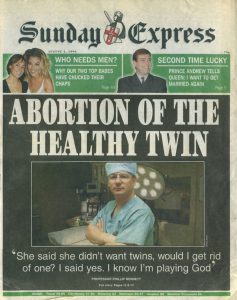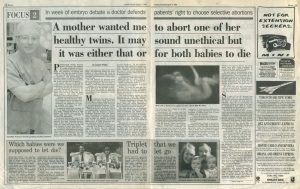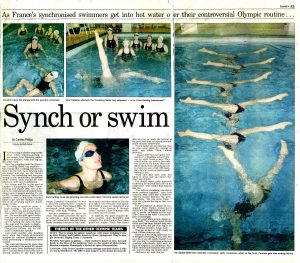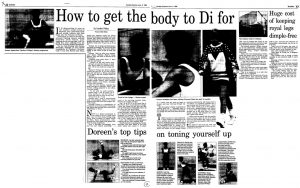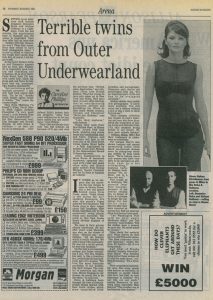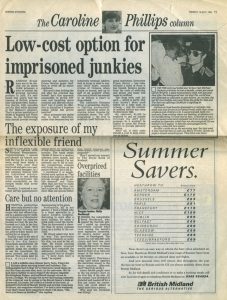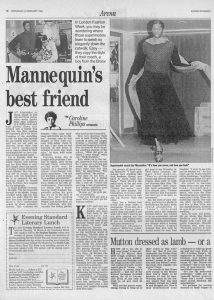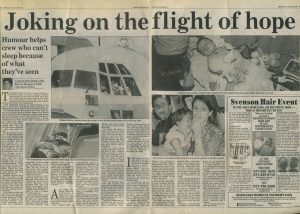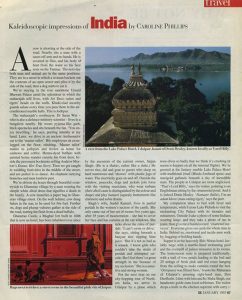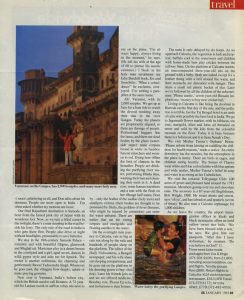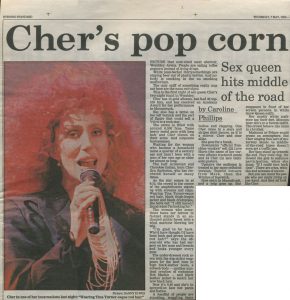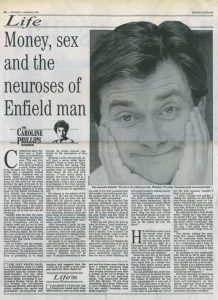The Hercules in which we are arriving in Sarajevo makes a tactical landing, suddenly nose-diving in case there is small arms fire. The Serbs take more pot shots in the afternoon when they’re drunk, but this is early morning. Still, the crew say they can’t underestimate the threat from the ground.
I feel frightened because, in contravention of the rules, I don’t have a flak jacket. This is Saturday, the day before this same plane is used for Operation Irma.
The homes around the airport have been razed by war and a black cloud of smoke hangs over Mount Igman. Serbs burning villages or villagers making tea, says one of the crew, wryly.
THE HERCULES in which we are arriving in Sarajevo makes a tactical landing, suddenly nose-diving in case there is small arms fire. The Serbs take more pot shots in the afternoon when they’re drunk, but this is early morning. Still, the crew say they can’t underestimate the threat from the ground. I feel frightened because, in contravention of the rules, I don’t have a flak jacket. This is Saturday, the day before this same plane, known to the crew as Fat Albert, is used for Operation Irma.
The homes around the airport have been razed by war and a black cloud of smoke hangs over Mount Igman. Serbs burning villages or villagers making tea, says one of the crew, wryly. The humour of the crew is macabre, like that in an operating theatre, a doctor comments later. The lashing tape is marked in red pen, ‘same shit, different day’. And they have sayings like: ‘You can kick ass or save Sarajevo – but you can’t do both.’ On the ground in Sarajevo, Foreign Legionnaires run around among white UN armoured vehicles. We deliver 26,000 lbs of tinned tuna and flour, with the plane engines still running. They like to get out in three minutes flat. But we’re picking up 30 Canadian soldiers going on rest and recreation leave, so we don’t manage to turn around for a full eight minutes.
The Canadians have been there for three months. What’s it like? Squaddie Guy, 20, smiles and looks puzzled. ‘I hope it’ll never be like that again.’ Tim Gunter is horrified. ‘There are little kids stepping on mines and people skinny and with fear in their eyes.’
Sergeant Renaud Marc asks: ‘Any news on that little girl? Nice of your PM to do that.’
In the body of the aircraft, eight racks for stretchers are pinned at the back, ready for the following day.
Azure lakes, ravines and hills blue in the morning mist of former Yugoslavia stretch beneath us. ‘They should be lying on the beaches bathing,’ says Flight Sergeant Steve Askey, with a bewildered expression. A UN Tornado buzzes underneath us in the opposite direction. ‘Why are the Press all here now?’ asks another crew member ingenuously. ‘Where have you been for the last 15 months?’
Back in Ancona, the doctors and those they teasingly call ‘just nurses’ are preparing themselves. They’re learning useful phrases like ‘are you thirsty or in pain?’ from the Red Cross phrasebook. ‘What’s Serbo-Croat for ‘I want to see a proper doctor?” jests one.
‘How about ‘are you private?’ or ‘I want a second opinion?” ‘Or ‘wait’. After all, they are going to the NHS.’
They are working intensely, lightening their load with humour. You couldn’t meet a nicer, better-meaning bunch. One doctor talks sensitively about the effects on his psyche of dealing with emergency cases. ‘It’s OK while I’m doing the job, because I’m plugged in. But afterwards I can’t sleep for thinking about it.’
They mind about the added load their absence forces on their colleagues at home. And they care deeply about the well-being of those to be evacuated. To many of them, the ages of the evacuees are immaterial: Their health is more important.
They express fear at inadvertently saying to journalists something construed as politically inflammatory. Their leader, Tony Redmond, has worked so hard to achieve these mercy missions and is paranoid about the Press.
By Saturday afternoon, the medical team has been forbidden to speak to journalists. The instruction came from ‘very high up’, they say. Information is scant, but Operation Irma, they think, is becoming very political.
The question of whether Bosnian soldiers are to be evacuated is denied by officials. And the international slanging match about who to evacuate is hotting up between UN officials and cynical politicians keen to score political advantage.
You sense the doctors’ acute awareness of being used as pawns by politicians. They seem to want to mutiny against their enforced silence. You point out that they are only there because of the media and you note grateful recognition and a wish to help on their faces.
They are here simply because they want this to be the start of many humanitarian operations to rescue the sick and injured from a war zone. But they know they are simply putting a plaster on the gaping wound that is the medical problem of Sarajevo.
You find yourself thinking, simplistically, that children deserve priority in evacuations in this increasingly shambolicly organised public relations exercise with a media circus, photo opportunities and allegations of soldiers being rescued.
Now the medical team, which has divided into teams with specific duties, is preparing the field hospital on the civilian and military airbase of Ancona. It is set up in a cargo hangar next to three army tents – one with a Union Jack, one with a French flag and one with a Sky satellite dish. ‘’‘’‘’
There are canteen and toilet facilities and another area for walking wounded. And stretchers, toys, blankets, boiled sweets and fizzy drinks. Huge plastic bags filled with drugs hang on the walls. And hand-coloured nursery pictures of animals – a mouse carrying a breakfast tray on his head reads, ‘a little love makes a lot of difference’.
Information on the number and ages of evacuees and time of airlift changes frequently. As does the appallingly coordinated Ministry of Defence list of journalists allowed to accompany the flight.
I beg a place on a German plane going to Sarajevo, in an effort to see the casualties being loaded. ‘Welkom to zer Germunn airforce,’ they say, beaming. But a little MoD hiccup puts paid to that. So I secure a place on a Canadian flight and maybe it is the Overseas Development Administration which sees an end to that.
At 1.40 local time on Sunday, the tail of the Hercules carrying out Operation Irma opens. Three ambulances, assorted military and a Red Cross representative in fluorescent green jacket stand by. There are 21 people including seven children, plus 16 relatives. Some of the children the RAF team saw as priorities stayed behind.
A doctor stands by the hangar door, keeping telephone contact. The first through the tailgate is chronic meningitis sufferer Belma Salaka, three, with a breathing tube taped to her mouth. Seven people, mostly soldiers, carry her stretcher, careful not to jog her. It was her plight that prompted John Major to demand the number of children on the flight be increased. They bring out nine-month-old Eldar Kalamujic, a nurse shielding his face from the sun. He has liver disease. The TV crews and photographers fight for space, pushing through the restraining rope. The media throng becomes more unmanageable as time goes on and the police offer to make arrests. Now there are some relatives and walking wounded with bandaged eyes – clean but thin. They look tired but relieved. Then a third emaciated boy is carried out. There is 11-year-old Edhen Dedovic, denim-clad, with his right cheekbone eaten away by a mortar wound and his left eye gouged out by shrapnel, walking off, waving delightedly to the crowd.
There are nine on stretchers and walking wounded of military age. One man on a stretcher sticks up his fingers in a Bosnian army victory salute. Curiously there is only one woman, 44-year-old Branka Franic. Then they start to load them on the chartered Russian Tupulev 154 jet, a blue striped plane beneath a blue sky. It made the Red Cross ODA trip to Banja Luka last year.
It is five years old with torn carpets and seats folded down to accommodate stretchers. The doctors dub it a flying intensive care ward, saying its equipment is comparable to a ground hospital.
Professor David Southall, the only consultant paediatrician in the team, said: ‘The mission is orientated to moving children from the war zone. That’s what we’re hoping for if the Bosnian doctors and parents agree. Otherwise they have no hope. They are in a war zone which is getting worse.’



